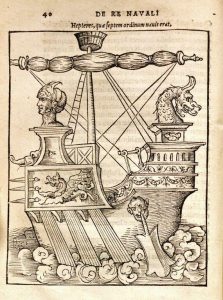In 16th-century Spain, manuals detailing the finer points of sailing and navigation were printed. It was the Age of Discovery and the country was establishing lucrative trade routes across the seas while expanding their colonial empire. Other nations were keen to tap into the Spaniards’ great expertise found in this literature, as there was little maritime information published elsewhere. Books were a means of developing knowledge of geography and voyaging to be competitive in trade to parts unknown. Given the economic incentives, there was a high demand for translations.
Tag: Maritime History

Brewing and seafaring are mainstays of ancient human endeavors. Beer was first fermented by at least the 5th millennium BC in Mesopotamia. From the land between the Tigris and Euphrates Rivers of the Fertile Crescent, the grain beverage either traveled along trade routes or was spontaneously developed in other ancient civilizations (including Egyptian, Grecian, Roman, Norse, Aztec, Chinese) before landing in northern Europe in the early medieval period. Producing beer became a standard domestic chore in households, and later, on a slightly larger scale, in taverns and monasteries.


